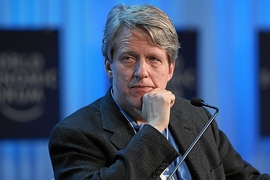Jean Tirole PhD ’81, a scholar whose longstanding ties to MIT include service on the economics faculty from 1984 to 1991, has been awarded the 2014 Nobel Prize in economic sciences for his work on the behavior and regulation of powerful firms.
Research by Tirole, 61, now a professor of economics at the University of Toulouse in his native France, has highlighted the need for regulation to be tailored to individual industries, while creating a general framework for understanding the nuances of regulation across industries.
Tirole received his PhD in economics from MIT in 1981 under the supervision of Eric Maskin, a former MIT professor (now at Harvard University) who was himself a winner of the Nobel Prize in economic sciences in 2007.
Tirole remains an MIT faculty affiliate as the Annual Visiting Professor of Economics in MIT’s Department of Economics. He has co-authored papers with a number of members of the MIT economics faculty, including Olivier Blanchard, Jerry Hausman, Bengt Holmstrom, and Paul Joskow. Tirole and Holmstrom co-authored a 2011 book about liquidity in markets, “Inside and Outside Liquidity.”
Focus on oligopoly
Many of Tirole’s research advances have involved cases of oligopoly, where a few firms dominate a given industry, controlling the quantity and quality of goods being produced, as well as prices.
“From the mid-1980s and onwards, Jean Tirole has breathed new life into research on such market failures,” the Royal Swedish Academy of Science, which grants the Nobel awards, stated on Monday. “His analysis of firms with market power provides a unified theory with a strong bearing on central policy questions: how should the government deal with mergers or cartels, and how should it regulate monopolies?”
The academy emphasized that its award to Tirole also recognizes many of his findings on regulatory policy, some of which employ game theory and contract theory to describe the dynamics of regulating markets. For instance, regulators may know less than they wish about a firm’s costs and strategic options, so regulators can offer firms a series of options, in essence, regarding the regulatory contract the firm will enter into. It may also make sense, Tirole has concluded, for regulations to be drawn up in recognition of the fact that firms may hide information from regulators.
As the Nobel citation also noted, Tirole observed the potential for phenomena such as the “ratchet effect,” which relates to the timeframe of regulations: If a company does well in a short-term regulatory time frame, regulations may be ratcheted up, lowering the incentives for the firm to perform as well. Alternately, Tirole has suggested, regulators might impose lesser conditions and study their effects.
Tirole, who often worked with another colleague, the late French economist Jean-Jacques Laffont, "really changed the field of regulation," according to Glenn Ellison, the Gregory K. Palm Professor of Economics and an expert in industrial organization. By bringing game theory and other tools to bear on the field, Ellison notes, Tirole helped produce a whole series of systematically developed insights about regulation, which policymakers and regulators could examine and apply to relevant industries.
Ongoing MIT connections
Ellison, who took a course from Tirole in the late 1980s while working on his PhD at MIT, also describes the new Nobel laureate as a "wonderful teacher" with a knack for communicating the essence of a complicated problem. Indeed, Tirole now spends a week guest-teaching every year in classes at MIT, including a graduate course Ellison gives, among his other activities at the Institute.
"Jean has had, and continues to have, a strong presence in the MIT economics department," says Holmstrom, the Paul A. Samuelson Professor of Economics and Management at MIT. "We are all immensely proud of his achievements and happy about the Nobel Prize."
Holmstrom observes that Tirole "has a formidable ability to analyze complex problems," and that his "work ethic is impeccable and his willingness to give time and comments to other researchers is amazing. ... As a collaborator, he is frighteningly fast. He would be very intimidating if it wasn't for his total lack of pretension."
Tirole received engineering degrees from the Ecole Polytechnique and the Ecole des Ponts and Chausees in 1976 and 1978, respectively, and a mathematics degree from Universite Paris Dauphine. He received his doctorate from MIT in 1981.
The Nobel Prize in economics is formally known as the Sveriges Riksbank Prize in Economic Sciences in Memory of Alfred Nobel, and has been given since 1969. Tirole is the 81st winner of a Nobel Prize with significant ties to MIT. Four professors have won the Nobel Prize in economic sciences while serving as members of the MIT faculty; including Tirole, 10 MIT alumni and five former MIT faculty have won the Nobel Prize in economic sciences.









